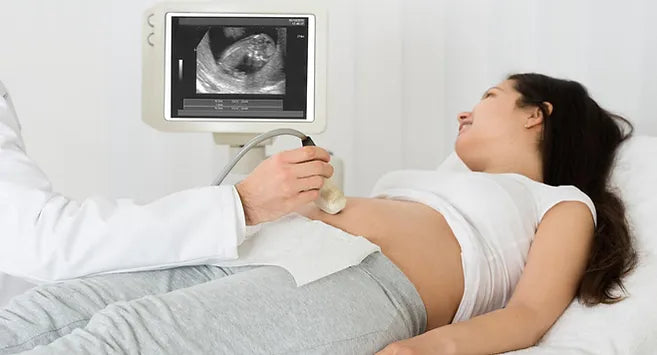What is amniocentesis?
Amniocentesis is a specialized prenatal test in which a small amount of amniotic fluid is removed from the sac surrounding the fetus for testing. The sample of amniotic fluid is removed through a fine needle inserted into the uterus through the abdomen, under the guidance of ultrasound. The fluid is then sent to a laboratory for analysis. Different tests can be performed on a sample of amniotic fluid, depending on the genetic risk and indication for the test.
Why is amniocentesis performed?
Amniocentesis is a diagnostic test which can determine with almost complete certainty whether or not your baby has certain conditions, abnormalities, and birth defects.
Amniocentesis does not detect all birth defects, but it can be used to detect the following conditions if the parents have a significant genetic risk:
- Down syndrome
- Sickle cell disease
- Cystic fibrosis
- Muscular dystrophy
- Tay-Sachs and similar diseases
Amniocentesis can also detect certain neural tube defects (diseases where the brain and spinal column don't develop properly), such as spina bifida and anencephaly.
If you are having an amniocentesis, you may ask to find out the baby's sex; amniocentesis is the most accurate way to determine the baby's gender before birth.
An amniocentesis can also be done during the third trimester of the pregnancy to determine if the baby's lungs are mature enough for delivery, or to evaluate the amniotic fluid for infection.
Who can have an amniocentesis?
You will also be offered an amniocentesis if you have had a 'screen positive' result from a screening test, indicating that your baby is at higher risk than usual of having chromosomal problems. Other women who are sometimes offered amniocentesis are those with a family history of certain chromosomal abnormalities, or who have already given birth to a child with a genetic abnormality or whose partners have a family history.
When will I have the test?
Amniocentesis for genetic testing is usually performed between week 15 and 18 of pregnancy. However, it can be performed later in gestation. Amniocentesis before the 14th week has been shown to carry a higher risk of miscarriage. By the second trimester, however, there is enough amniotic fluid surrounding the baby to make it easier for your doctor to take an adequate sample with minimal risk to your baby. If your baby needs to be delivered several weeks before the due date, your doctor may suggest an amniocentesis to check if certain components are present in the fluid that indicate that her lungs are mature.
Should I have an amniocentesis?
Only you can make that decision. Some women want to know as much as possible about their baby before birth, and others would rather wait until their baby is born. If you know in advance that your baby has a congenital abnormality, it can give you time to learn about the kind of help he will need.
How is the test conducted?
Your doctor will request you lie down on an examination couch, and using ultrasound for guidance, will identify a pocket of amniotic fluid a safe distance from both your baby and the placenta. You may choose to have a local anaesthetic to numb your abdomen first. A long, thin, hollow needle is then inserted through your abdominal wall and into the sac of fluid surrounding your baby. A small amount of amniotic fluid (around two tablespoons, or 20ml) is withdrawn, which contains cells, substances, and micro-organisms from your baby that can answer many questions about your baby's health.
Finding the right spot and guiding the needle to the right position using the ultrasound scan can take up to 20 minutes. Inserting the needle and withdrawing the amniotic fluid takes only about five minutes. Once the needle is out, you may have some tummy cramps. A midwife will monitor you for a while to check whether you are having any uterine contractions and to listen to your baby's heart-beat. Does it hurt?
The majority of women feel a stinging as the needle is inserted, however everyone experiences the procedure differently and it may feel different with one pregnancy than with another. Most women say at the end of the procedure that it was less painful than they expected.
Any tummy pains you experience afterwards are usually minor, but some women have serious cramps. Your midwife is likely to advise you to rest for 24 hours following the test as a precaution.
Are there any risks?
If you experience any of the below contact your health practitioner immediately.
- Infection – symptoms include fever
- Vaginal leakage – amniotic fluid may leak from the vagina (in about one per cent of cases)
- Spontaneous abortion – can occur in less than one per cent of women undergoing this test. Exact figures are hard to calculate, since some miscarriages would have happened anyway, with or without the amniocentesis.
- Rh sensitisation – rarely, the baby’s blood cells may enter the mother’s bloodstream. If the mother is Rh negative, she may form antibodies that attack the baby’s red blood cells. To prevent this, an Rh negative mother will be given Rh(D) immunoglobulin (anti-D).
- Injury to the baby – very rarely, the needle used during the procedure may accidentally touch some part of the baby's body.
- Miscarriage – estimated one in 200
If you're uncertain whether to have an amniocentesis, or if you're very anxious about the procedure, be sure to voice your concerns with your midwife, doctor or genetic counselor beforehand, who will be able to give you a full account of the pros and cons, and tell you exactly what happens when the procedure is performed. What happens after the test?
Having amniocentesis or CVS or any other antenatal test can be physically and emotionally exhausting. Your carer will advise you to rest afterwards and arrange someone else to drive you home. If you can, spend the rest of the day relaxing and avoid any vigorous exercise or sex for three days. You may have some cramping in your tummy and a slight loss of blood from the vagina in the first 24 hours after the test. These are possibly normal side effects, but let your doctor or midwife know. If you notice clear fluid leaking from your vagina, contact your doctor or midwife immediately.
You might have to wait up to a fortnight for the results of the amniocentesis. This is probably going to be a very difficult time. It might help to keep busy, and give yourself several treats to help pass the time as easily as possible.
Source: https://www.webmd.com/baby/pregnancy-amniocentesis#1

